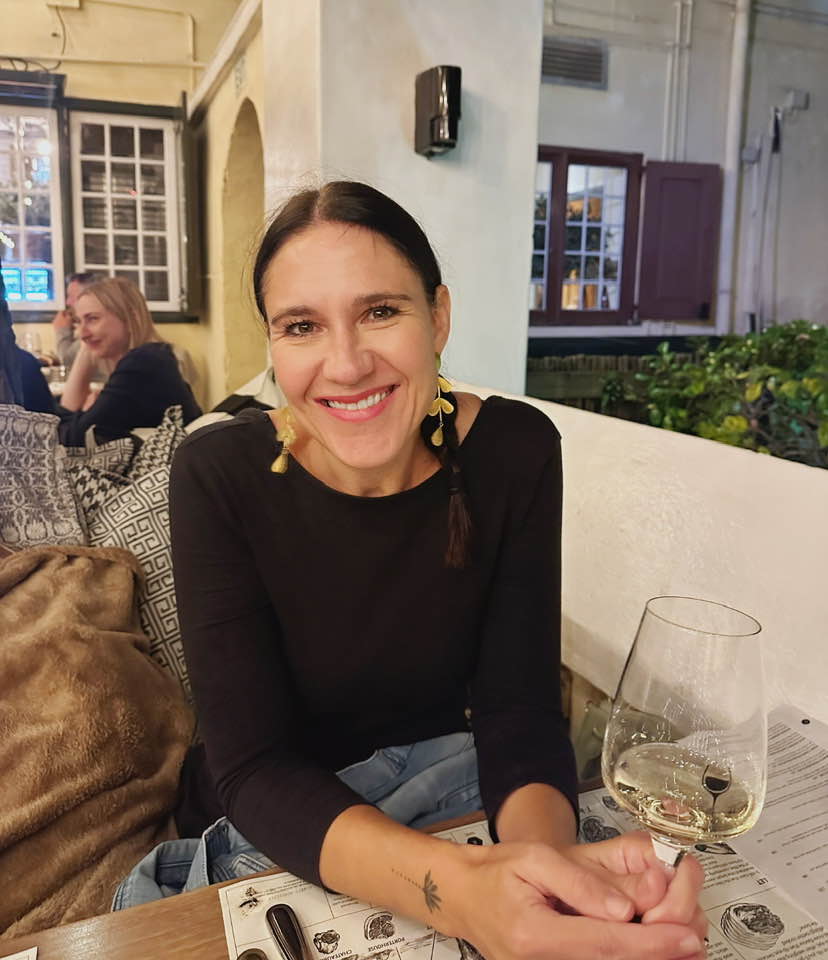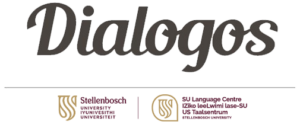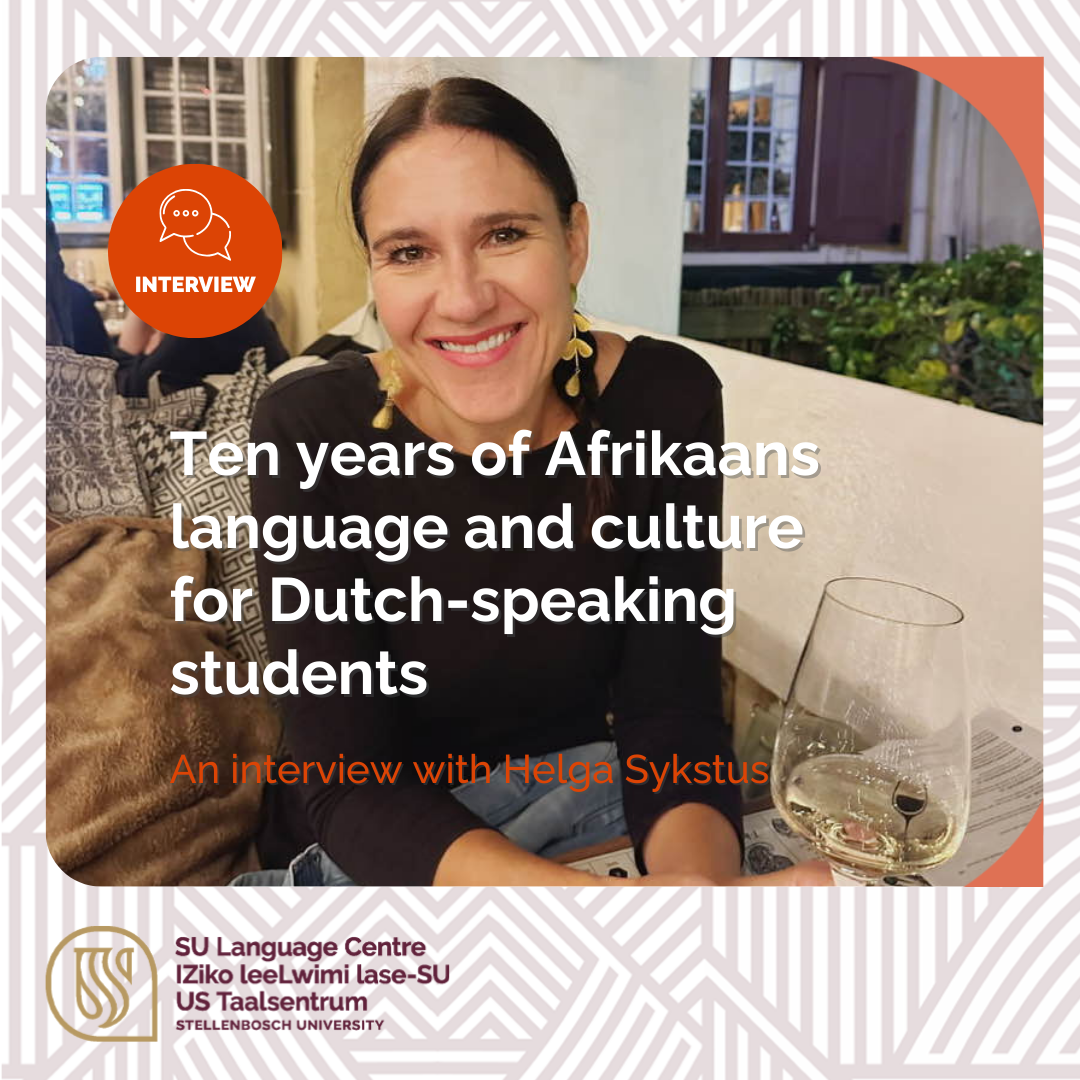
This year, it will be ten years since Helga Sykstus, lecturer and coordinator at the SU Language Centre with more than 20 years of experience, had launched the Afrikaans language and culture for Dutch-speaking students. This course offers exchange students from the Netherlands or Belgium the opportunity to develop a deeper understanding and appreciation of the Afrikaans language and culture. It is, therefore, so much more than just a language course – it is more of a 3D experience of Afrikaans within the South African context: from the literature, history and politics, to the arts, music, recipes and ‘false friends’ that make Afrikaans so diverse, rich and lekker to listen to, read and speak.
In celebration of the tenth year of existence of this unique course – which attracts many interested students from the Low Counties – we talked to Helga about this special offering.
Why did you decide to start this very specific course in 2015, now ten years ago? How does this course differ from the Language Centre’s courses for local and international participants from countries other than the Netherlands or Belgium, who do not speak Afrikaans at all?
The courses in Afrikaans offered to foreign students as part of the Global Education Programme (GEP) by SU International, the international office of the University, have been an institution for more than two decades. A course specifically aimed at Dutch speakers had, therefore, existed before 2015, but the course was focused more on literature, and we had to suspend the course for about three years, due to costs and the lack of a presenter. At the start of 2015, a former colleague, Karlien Cillie, and I then decided that we would like to start the course once more, but with a somewhat different approach and flavour. Both of us spent some time in the Netherlands and Belgium as part of our studies, so we didn’t just know the language, but also had the privilege to experience some aspects of the cultures. We felt that simply offering a traditional language course for Dutch speakers would be too limiting and that we could achieve so much more with a course that also has a strong focus on the culture of the people who speak the language. The seed was planted, our proposal was accepted and in Julie 2015, we had our first group of students from the Netherlands and Belgium.
What are the main differences between Dutch and Afrikaans?
The differences we deal with in the course are mainly differences in the meaning of words and concepts, as well as grammatical structures such as pronouns, articles, verbs and tenses. I love showing students that despite Afrikaans seemingly being so similar to Dutch, there are many differences between the languages. They are not only learning a ‘new’ language by acquiring these words and concepts, but are also learning something about the culture. This opens up a new world to them. Students are exposed to loan-words such as “gogga”, “kierie”, “piesang”, “baklei”, “sambreel” and “kombers”, and then we also focus on the many ‘false friends’ between Afrikaans and Nederlands such as “amper”, “boodskappe”, “mug”, “geit”, “kaal”, “motor”, “stoep”, “vies” and “vaak”. And then there are the many words that we use differently or that do not exist in Dutch; for example, “besig”, “oplaai”, “vervelend”, “bobbejaan”, “spookasem” and “hoendervleis”. The list is extremely long!
To what extent (and how) is culture involved in this course? How does this connect with your view on the role of the language lecturer?
I believe that, if one chooses to live in another country for some time, one should make the effort to be able to communicate, on a basic level at least, with the local people in their language. After all, you want to become part of the community and one of the best ways of doing so is through language – even more so if you are a Dutch speaker living in an Afrikaans community. However, it is not just about communication. By learning the language, you also start becoming part of the culture, a culture that is much, much more than braai and rugby and the big five. Language is the key to culture, especially in a country such as South Africa.
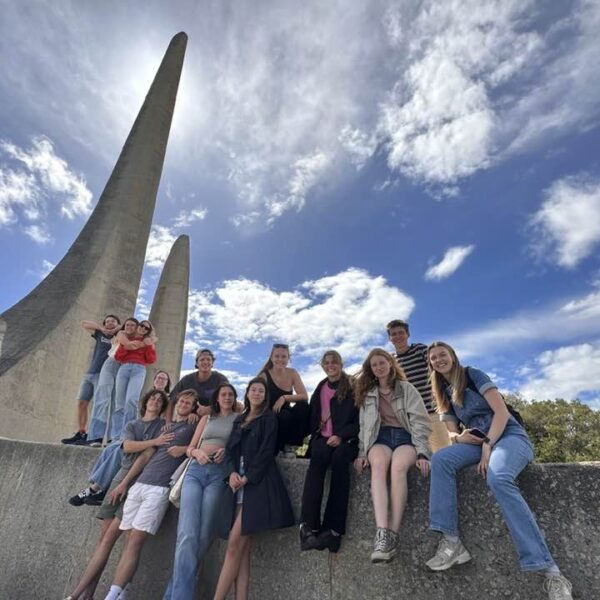
A visit to the Afrikaans Language Monument in Paarl.
Language is the key to culture, especially in a country such as South Africa.
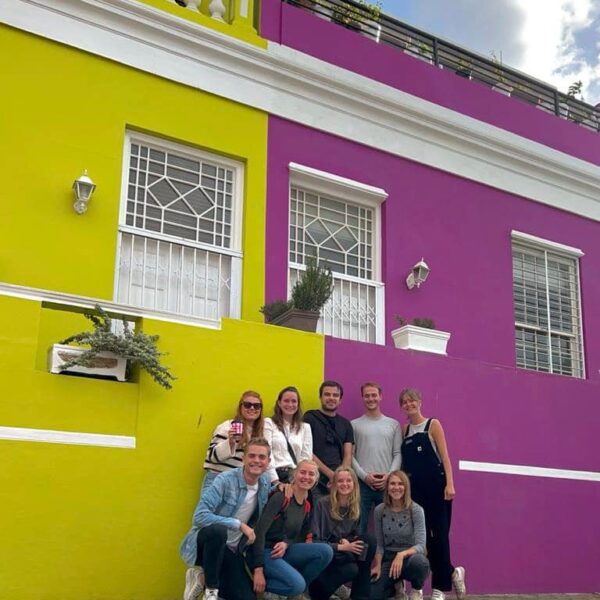
A tour of the colourful Bo-Kaap, where a number of variations of Afrikaans can be heard, and Cape Malay foods like koesisters and bobotie rule.
Which themes and activities do you involve in this course?
Apart from the language component, I focus on topics such as the origins of Afrikaans, the communities that speak Afrikaans and the various forms of Afrikaans. Students are also given a synopsis of South African history, with reference to specific important moments in our history. We look at Afrikaans music and how music may be used as cultural text. Another theme is our relationship with the land and earth. All these themes are used to gain a deeper understanding of South African culture, but more specifically, the complex and diverse Afrikaans culture and identity. Apart from these critical discussions, we also go on a number of outings. I take students on guided tours to the Stellenbosch Village Museum, the Afrikaans Language Monument and the District Six Museum. And I always invite a stalwart guest speaker to come and speak to the students about their field or experiences. Everything in Afrikaans, of course.
All these themes are used to gain a deeper understanding of South African culture, but more specifically, the complex and diverse Afrikaans culture and identity.
The course places a lot of emphasis on identity. Why? And how do you tackle explaining to your students what is generally regarded as characteristic of the Afrikaans culture?
Well, we are all born into a certain culture or cultures, but identity is something that is then formed and influenced by various factors. And I think that it is problematic to just talk about culture without involving identity. It is important to me that students are able to distinguish between something like Afrikaans culture (quite complex in its own right), and how it differs from identity.
I encourage students to reflect on their own identities and the factors that play a role in the formation of and possible changes to identity.
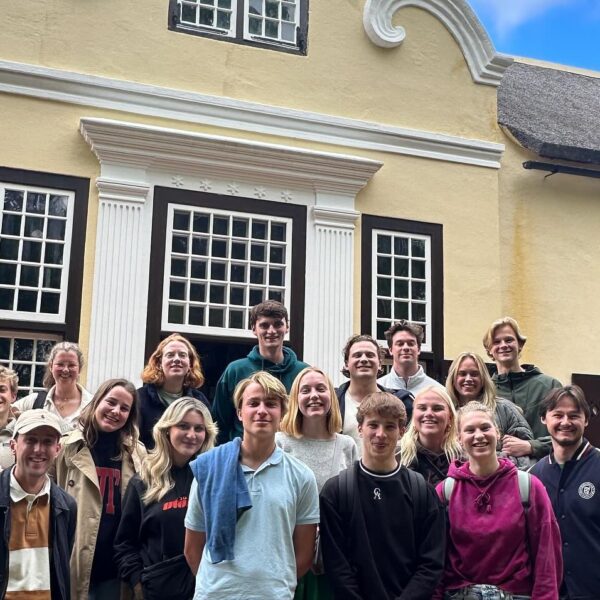
The 2023 group visiting Vergelegen Wine Estate.
For example, language constitutes a large part of the identity of many South Africans and Afrikaans speakers in particular, while this is not necessarily the case for the average person from the Netherlands or Belgium. Belgians who speak Flemish also generally have a stronger relationship with language than people from the Netherlands. Similarly, your origin, or where you grew up, also plays a role in the formation of identity. Students say time and again that the conversations about culture and identity we have in the course are often the first time they are asked to reflect on those topics.
It is important to me that students are able to distinguish between something like Afrikaans culture (quite complex in its own right), and how it differs from identity. I encourage students to reflect on their own identities and the factors that play a role in the formation of and possible changes to identity. […] Students say time and again that the conversations about culture and identity we have in the course are often the first time they are asked to reflect on those topics.
What, in your opinion, are the most important outcomes of the Afrikaans language and culture course for students from the Netherlands and Belgium?
Developing an understanding and appreciation of the diverse and complex Afrikaans culture in all its forms within the broader context of South Africa.
Have you experienced that international students have been able to achieve these outcomes over the past ten years? Are there other insights and experiences that you have noticed students who complete this course take with them to the Netherlands or Belgium?
Yes, I think the outcomes are definitely achieved!
A number of years ago, Liselotte Voets, a Belgian exchange student from the Catholic University Leuven (KU Leuven), who was at SU as part of her master’s degree in philosophy, took the Afrikaans course for Dutch-speaking students while she was in South Africa. After the course, she shared her thoughts about freedom in Afrikaans in a Language Centre blog and it warmed my heart that she was also one of my students.
I also received the following in writing from one of my other students last year. This more or less sums up the feedback I regularly receive: “Baie dankie vir al die moeite en toewyding wat jy in ons Afrikaanse klasse insit. Ek het nie net soveel oor Suid-Afrika en sy kultuur geleer nie, maar ook baie oor myself. Die lesse en aktiwiteite het my gehelp om dinge op ’n nuwe manier in perspektief te sien en my wêreldbeskouing te verbreed. Ek waardeer die ruimte wat jy skep vir openhartige gesprekke en vir die geleenthede wat ons het gehad om die land en sy mense op so ’n unieke manier te ervaar. Met opregte waardering.” (Thank you so much for all the effort and commitment you put into our Afrikaans classes. I not only learned so much about South Africa and its culture, but also much about myself. The lessons and activities helped me to see things in perspective in a new way and to broaden my world view. I appreciate the space you create for frank discussions and for the opportunities we had to experience the country and its people in such a unique manner. With sincere gratitude.)
Read more about the Afrikaans language and culture course for Dutch-speaking students at SU here.
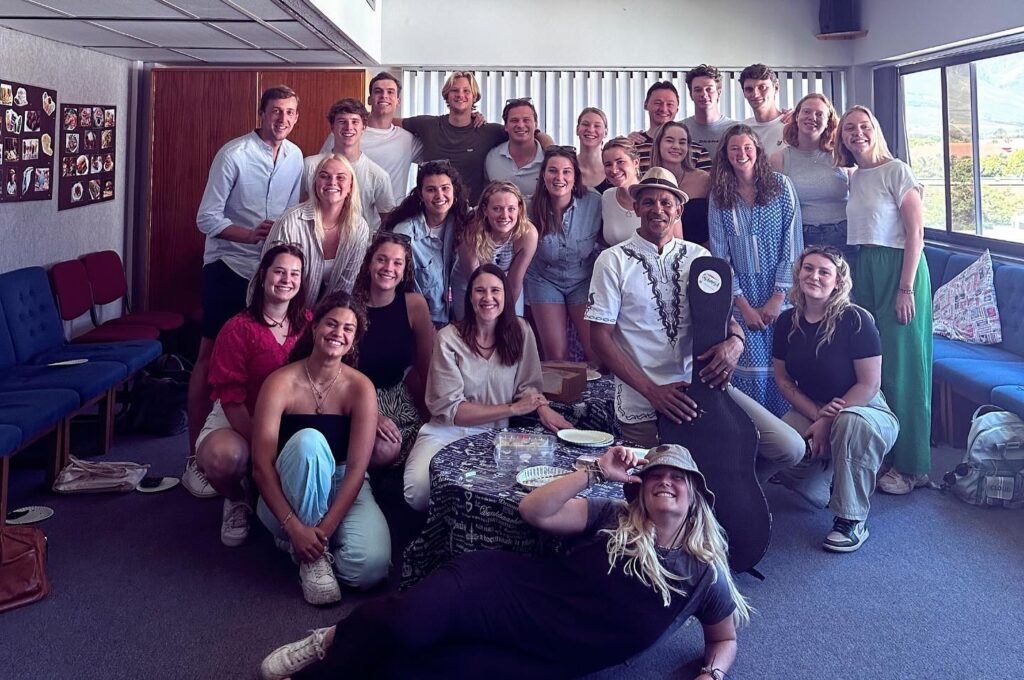
Musician Frazer Barry (right) is one of the regular guests that Helga (centre) invites to talk to students about Afrikaans music, culture and identity.
But what if you are not Dutch-speaking and still want to learn Afrikaans?
There are a number of options. If you are an exchange student, you may take the Beginner Afrikaans level 1 course through SU International. If you are a local SU student, then the Campus Afrikaans course is just the thing for you and if you are not connected to the University, Afrikaans 123 is the appropriate course to take. If you prefer learning at your own pace, then you could also consider our EdX course to start learning Afrikaans. And if you are unsure where to begin, feel free to send an e-mail to Helga at hbuys@sun.ac.za.
Did you know?
You can also learn isiXhosa or South African Sign Language (SASL) through the Language Centre. The courses are interactive and lots of fun.
Want to do your own thing with us at your side?
Also consider our EdX courses to start learning Afrikaans, isiXhosa or SASL independently and at your own pace.
– by Andréa Müller and Helga Sykstus

